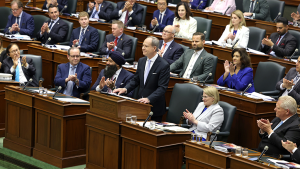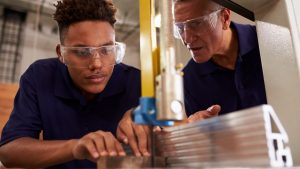Skills Ontario has partnered with Origin, an Indigenous firm based in northern Ontario, to offer youths virtual reality insights into the skilled trades and careers in technology.
The organizations signed a Memorandum of Understanding (MOU) in February.
“We thought it made really good sense for us to partner with them to do an MOU,” said Ian Howcroft, CEO of Skills Ontario, adding the partnership supports the three Cs of collaboration, coordination and co-operation.
“What we are trying to do is partner with as many groups as possible, particularly where we have common priorities, a strategic alliance. Origin has similar goals and objectives to what we’re trying to do and it just made sense for us to work on this together.”
Origin, a workforce development and recruiting agency based in Fort William First Nation near Thunder Bay, contributed 45 virtual reality headsets to Skills Ontario as a part of school outreach. The headsets utilize the ImmersiveLink system, created by Origin. It’s a virtual reality learning platform used to help companies recruit, educate and retain future employees by immersing recruits virtually into jobsites.
“ImmersiveLink is designed to engage and communicate more efficiently with today’s labour force,” said Melissa Hardy-Giles, owner of Origin, in an email to the Daily Commercial News. “The Skills Ontario partnership will support Origin and the distribution of the ImmersiveLink system into schools across Ontario, while increasing exposure, understanding and awareness of trades in students.”
Skills Ontario gives about 1,500 to 2,000 school presentations a year across the province.
“What we’re going to be doing is giving the liaison officers that go into the schools some VR glasses that they can take with them and provide another dynamic to their presentation, to bring some more experiential opportunity, to give students a feeling of what the opportunities could be like and try and enhance the presentations we are delivering,” said Howcroft.
“We want to make sure we are providing as interesting and relevant an experience as possible. We think that the VR opportunity with Origin was a great direction for us to move towards.”
The goal is to open students’ eyes to the opportunities available in the skilled trades and technology and to encourage them to consider those careers.
“Our goal is to have as many trade opportunities on the VR glasses as possible so that the kids can put that on and see what a trade is like,” explained Howcroft. “Many people have seen the welding virtual reality. It gives you the welding experience but it’s safe and you are still getting the sense of what it would be like to be a welder.”
Howcroft said Skills Ontario has been talking with its partners to offer more experiential learning.
“How do we get kids to be aware of what the skilled trades can provide them as a career but also offer for them to try some hands-on activities?” asked Howcroft. “We’re trying to do more and more of that, and the Origin partnership will allow us to do it in school presentations as well as supplement what we are doing in other areas.”
Hardy-Giles said the use of the technology can promote the trades to help address the skills gap.
“Our partnership with Skills Ontario is specifically designed to increase participation in trades, especially amongst Indigenous populations, and address that skills gap across Ontario,” she said.
“Our ImmersiveLink network is on pace to achieve over a million viewer experiences this year alone. With great partnerships like with Skills Ontario we will certainly exceed that expectation.”








Recent Comments
comments for this post are closed